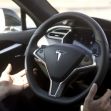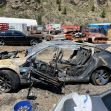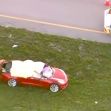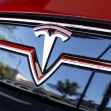A federal jury trial began Monday in Miami involving Tesla and the safety of its Autopilot driver-assistance system, following a fatal crash in Key Largo, Florida, in 2019. The lawsuit, filed by the family of Naibel Benavides Leon, 22, who died in the crash, and Dillon Angulo, who was severely injured, accuses Tesla of overstating the capabilities of its Autopilot technology and failing to ensure the safety of its users.
The incident occurred when George McGee, driving a Tesla Model S, dropped his phone and became distracted, causing the car to speed through a T intersection and collide with a parked Chevrolet Tahoe at more than 50 mph. Benavides Leon was struck and killed, her body discovered about 75 feet away, and Angulo was badly injured. McGee had activated the Tesla's Autopilot prior to the crash but admitted to police at the scene that he was distracted.
Tesla argues the accident resulted solely from distracted driving, noting in a statement that McGee had pressed the accelerator while searching for his dropped phone, effectively overriding the Autopilot system. The company maintains that its driver-assistance technologies, including Autopilot and the more advanced Full Self-Driving (Supervised) mode, require attentive drivers ready to intervene at all times.
Plaintiffs’ attorneys contend Tesla exaggerated Autopilot’s capabilities in marketing materials, thus encouraging unsafe driver behavior. Specifically, they cited a 2016 Tesla promotional video purporting to show a vehicle driving autonomously. Later testimony from a senior Tesla engineer, provided in an unrelated lawsuit, admitted the demonstration was staged and did not accurately reflect the technology’s real-world performance.
U.S. District Judge Beth Bloom allowed the lawsuit to proceed to trial despite Tesla’s motion to dismiss, concluding a reasonable jury might find Tesla's actions demonstrated reckless disregard for human life for the sake of profit.
Tesla further disputes allegations that it withheld crucial data from the crash investigation. Plaintiff’s attorneys previously accused the company of concealing important vehicle data, an accusation Tesla's legal representatives firmly deny.
Federal regulators have opened multiple probes into Tesla's Autopilot and Full Self-Driving systems amid ongoing concerns over safety and transparency. Although the company emphasizes that proper use of its technology significantly enhances safety, critics argue clearer regulations and transparency regarding autonomous driving features are needed.
The trial is expected to last three weeks, with the jury tasked with determining Tesla’s liability in a case watched closely for its implications on driver-assistance technologies and automakers’ responsibilities.






